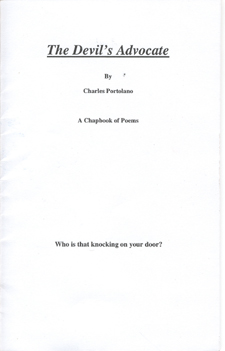|

Devil's Advocate
Charles Portolano
Review by Alyce Wilson
In his chapbook, Devil's Advocate, Charles Portolano
lays out his political philosophy through verse, with the goal of winning
others to his point of view. The poem "Paradise Lost" is his
ars poetica, setting out how he sees the function and purpose of poetry.
In his case, that is to make political statements, to speak truth to
power.
Playing the Devil's advocate,
the role of a poet,
to argue against what is
promoted as right
Questioning authority,
questioning the right
of one country to attack
another, unprovoked
However, in today's America, he sees this as a challenge, where free
thought is not welcomed.
At his front door a knock,
Two men dressed in black
From Homeland Security,
To take him in for questioning.
Such observations may have a grain of truth in them, but the most successful
political poetry doesn't just make blanket statements. Rather, it uses
language and imagery to reinforce those statements. The poetry in this
chapbook leans towards the polemical, often failing to back up statements
with anything that could convince the reader.
The closest that the poet comes to doing so is in "The Melting
Pot", an extended metaphor about racial tension in America:
always stirring
up trouble
for now the carrots
won't mix
with the peas
who won't go near
those poor potatoes
who turn their backs
on the onions
The most important thing poets like Portolano need to remember is that
poetry isn't just about making a statement. If you want to do that,
make a sign and carry it at a rally. Poetry is about language. Poetry
is about music. You can't just blurt out what you feel; you have to
craft it.
My main advice to Charles Portolano would be to read more poetry by
poets who succeed at getting political ideas across. Somebody like Gary
Soto might interest him, or of course, Leroi Jones, a.k.a. Amiri Baraka.
Poets like Baraka make political statements in a colorful, engaging
way that make the ideas more intriguing. Otherwise, while you may have
recorded your thoughts, you haven't moved anybody, or convinced them
your words are important. That, whether it's a political subject or
not, is the role of the poet.
RWG Press, 2005: ISBN 0-9659495-4-0
|